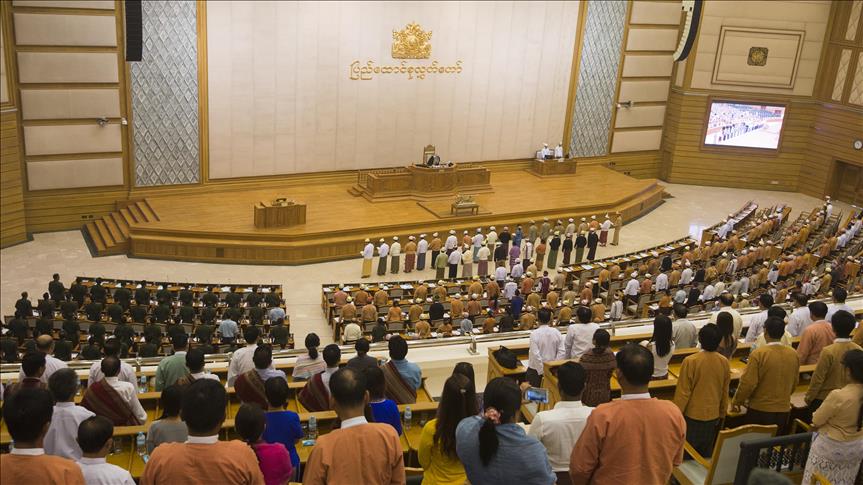Myanmar urged to release Muslim activists
Rights group calls on Suu Kyi-led government to break ‘decades-long cycle of politically motivated arrests,’ and free duo jailed under influence of Buddhist nationalists

Yangon
By Kyaw Ye Lynn
YANGON, Myanmar
An international rights group urged Myanmar’s new government Tuesday to pardon two Muslim activists who have been sentenced to two years prison on charges of contacting a blacklisted organization.
The two activists were prosecuted under pressure from a group of nationalist Buddhist monks responsible for a new set of laws governing race and religion -- an issue that continues to be a hot potato for Aung San Suu Kyi’s National League for Democracy (NLD)-led government.
Zaw Zaw Latt, 28, and Pyint Phyu Latt, 34, were found guilty Friday, the same day that the government released a total of 199 political prisoners after police dropped charges against them ahead of the country’s New Year holiday.
Lawyer Thein Than Oo has described the sentences as “totally unacceptable”, telling Anadolu Agency that his clients “were sentenced because they are Muslims, not for breaching any laws".
On Tuesday, Human Rights Watch (HRW) called on democracy icon Suu Kyi to "include these activists in the pardon process”.
The New York-based group underlined that the pardon should be granted as the government had pledged to follow a definition of political prisoner agreed upon by the NLD and former political prisoner organizations in 2014.
Under the agreement, a political prisoner is defined as “anyone who is arrested, detained or imprisoned for political reasons under political charges, or wrongfully under criminal and civil charges because of his or her perceived or known active role, perceived or known supporting role, or association with activity promoting freedom, justice, equality, human rights and civil and political rights, including ethnic rights, is defined as a political prisoner.”
HRW Asia director, Brad Adams, said that in order to “break the decades-long cycle of politically motivated arrests of peaceful critics of the government and military, Burma’s [Myanmar's] new government should look systematically at laws long used to stifle basic freedoms.”
Last week, the newly formed government Legal Affairs and Special Cases Assessment Commission proposed the amendment or repeal of 142 laws used to prosecute political activists, including the Unlawful Association Act under which Zaw Zaw Latt and Pyint Phyu Latt were sentenced.
Despite Myanmar’s first civilian President Htin Kyaw taking office March 30, the military still controls -- under the junta-drafted constitution -- three key ministries including the home affairs ministry, which has authority over the Myanmar Police Force, the Corrections Department and the Special Branch.
“Until the constitution is amended to put the police fully under civilian control and oversight, the threat of political arrests will remain,” said Adams in Tuesday’s statement.
Last week’s sentence by a court in Mandalay, the second largest city and a stronghold of Buddhist nationalist monks, was the second two-year term handed to Zaw Zaw Latt and Pyint Phyu Latt after they were convicted on immigration offenses in February for a 2013 visit to Laiza city.
Laiza is under the control of Kachin Independence Army (KIA) rebels.
The two were jailed following a campaign by a nationalist monks' journal, which claimed Zaw Zaw Latt was working with “Buddhist monks who betray Buddhism” and referenced his contact with the KIA and the photograph of him holding a rifle.
“No one knows who he will be pointing the gun at [next],” claimed journal Ahtu Mashi.
The NLD has been placed under intense pressure from observers and rights groups to solve religious discrimination in the country, while at the same time acting without offending Buddhist hardline groups such as Ma Ba Tha (the Race and Religion Protection Organization) which hold tremendous political sway.
The group draws its support from the country's uneducated Buddhist masses, and so early into its presidency the NLD may be unprepared to take on a court decision which many rights groups see as being influenced by Ma Ba Tha.








